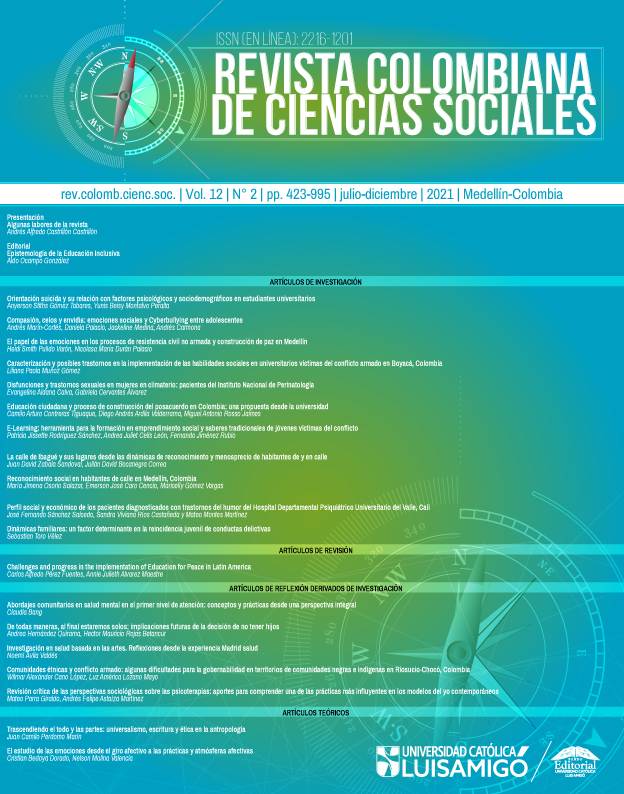Arts-based health research. Reflections from the Madrid Health experience
DOI:
https://doi.org/10.21501/22161201.3466Keywords:
Art-based health research, Art-based research, Visual arts, Public health, Health promotion.Abstract
This article reflects on the assumptions of Art-Based Health Research based on the experience of the Art and Health project in the public agency health of the Madrid City Council. Research in the field of art and health has a long trajectory that allows a critical analysis of the contributions and also a reflection on the transcendence and impact of such research. The article gathers aspects of Arts-Based Health Research, which is based on arts-based research, and which raise theoretical, methodological and ethical questions and conflicts. The work developed in Madrid’s health since 2011 allows a review from the practice of these issues and a wide field of experimentation to reflect on the challenges of this research approach.Downloads
References
Ávila, N., Claver, L., Larraín, C., Azcona, C., Segura, J., & Martínez, M. (2019). Art, Health Promotion and Community Health: Constructing the ‘Madrid Salud’ Model. Journal Applied Arts and Health, 10(2), 203-217. https://doi.org/10.1386/jaah.10.2.203_1
Azcona, C. (2020). Proyecto ARVICO. Arte, Vínculo y Comunicación. Metodologías artísticas para el aprendizaje y mejora de habilidades de la comunicación en personas con trastorno mental grave. En G. Román, N. Idoyaga y D. Apaolaza (Coords.), Metodologías y herramientas inclusivas en contextos educativos (págs. 113-123). Grao.
Barone, T. (2001). Science, Art, and the Predispositions of Educational Researchers. Educational Researcher, 30(7), 24-28. https://doi.org/10.3102/0013189X030007024
Barone, T. & Eisner, E. (2006). Arts-Based Educational Research. En J. Green, C. Grego and P. Belmore (Eds.), Handbook of Complementary Methods in Educacional Research (págs. 95-109). AERA.
Boydell, K. M., Brenda, M., Gladstone, M., Volpe, T., Allemang, B. & Stasiulis, E. (2012a). The Production and Dissemination of Knowledge: A Scoping Review of Arts-Based Health Research. Forum Qualitative Sozialforschung / Forum: Qualitative Social Research, 13(1). http://dx.doi.org/10.17169/fqs-13.1.1711
Boydell, K. M., Volpe, T., Cox, S., Katz, A., Dow, R., Brunger, F., Parsons, J., Belliveau, G., Gladstone, B., Zlotnik-Shaul, R., Cook, S., Kamensek, O., Lafrenière D., & Wong, L. (2012b). Ethical Challenges in Arts-based Health Research. The International Journal of The Creative Arts in Interdisciplinary Practice, IJCAIP, 11. https://www.researchgate.net/publication/265042212_Ethical_Challenges_in_Arts-based_Health_Research
Castillejo, M. (2019). Replanteando el Bulevar: Un jardín vertical como intervención artística y comunitaria. EARI, Educación Artística Revista de Investigación, (10), 082-094. http://dx.doi.org/10.7203/eari.10.14246
Castillejo, M., Fernández-Cedena, J., Siles, S., Claver, L., y Ávila, N. (2018). Batas Nómadas en Madrid Salud: el arte y los artistas en equipos profesionales de salud comunitaria. Gaceta Sanitaria, 32(5), 403-502. https://doi.org/10.1016/j.gaceta.2018.03.008
Clift, S. & Camic, P. (2016). Introduction to the Field of Creative Arts, Wellbeing, and Health: Achievements and Current Challenges. En S. Clift and P. Camic, Creative Arts, Health, and Wellbeing. International Perspectives on Practice, Policy, and Research (págs. 3-10). Oxford University Press.
Cole, A. L., & Knowles, J. G. (Eds.). (2008). Handbook of the Arts in Qualitative Inquiry: Perspectives, Methodologies, Examples and Issues. Sage Publications.
Corrigan, P. W. (2000). Mental Health Stigma as Social Attribution: Implications for Research Methods and Attitude Change. Clinical Psychology Science and Practice, 7(1), 48-67. https://doi.org/10.1093/clipsy.7.1.48
Creative & Credible. (s.f.). University of the West of England, Willis Newson, ESRC. http://creativeandcredible.co.uk/
Eisner, E. (1995). What Artistically Crafted Research Can Help us to Understand about Schools. Educational Theory, 45(1), 1-6. https://doi.org/10.1111/j.1741-5446.1995.00001.x
Fraser, K., & al Sayah, F. (2011). Arts-based Methods in Health Research: A Systematic Review of the Literature. Arts & Health, 3(2), 110-45. https://doi.org/10.1080/17533015.2011.561357
Hodgins, M. J., & Boydell, K. M. (2013). Interrogating Ourselves: Reflections on Arts-Based Health Research. Forum Qualitative Sozialforschung/ Forum: Qualitative Social Research, 15(1). https://doi.org/10.17169/fqs-15.1.2018
Jones, K. (2006). A Biographic Researcher in Pursuit of an Aesthetic: The Use of Arts-based (Re)presentations in “Performative” Dissemination of Life Stories. Qualitative Sociology Review, 2(1), 66-85. http://www.qualitativesociologyreview.org/ENG/Volume3/QSR_2_1_Jones.pdf
Keen, S., & Todres, L. (2007). Strategies for Disseminating Qualitative Research Findings: Three Exemplars. Forum Qualitative Sozialforschung / Forum: Qualitative Social Research, 8(3), s.p. https://doi.org/10.17169/fqs-8.3.285
Knowles, J. G., & Cole, A. L. (Eds.). (2008). Handbook of the Arts in Qualitative Research: Perspectives, Methodologies, Exemplars, and Issues. Sage Publishing.
Larraín, A., Azcona, C., Ávila, N. y Claver, M. (2018). Arte como recurso de salud y bienestar: una experiencia con mujeres a partir de la exposición de Cai Guo-Qiang del Museo Nacional del Prado. Agathos: Atención Sociosanitaria y Bienestar, (3), 52-61. http://www.revista-agathos.com/Publicados/2018/septiembre/septiembre.pdf
Madrid Salud. (s.f.). Madrid ciudad de los cuidados. http://madridsalud.es/que_es_mcc/
Madrid Salud. (2018). Barrios saludables. La estrategia municipal de promoción de la salud. 2016-2019. Instituto de Salud Pública. http://madridsalud.es/pdf/publicaciones/saludpublica/BARRIOS_SALUDABLES_2018.pdf)
McNiff, S. (2013). Art as Research: Opportunities and Challenges. Intellect Ltd.
Organismo Autónomo Madrid Salud del Ayuntamiento de Madrid y Universidad Complutense de Madrid (2019). Arte, salud y cuidados. https://eprints.ucm.es/58719/1/dossier%20ARTE%20SALUD%20CUIDADOS.pdf
Pauwels, L. (2010). Visual Sociology Reframed: An Analytical Synthesis and Discussion of Visual Methods in Social and Cultural Research. Sociological Methods Research, 38(4), 545-581. https://doi.org/10.1177/0049124110366233
Segura, J., Martínez, M., Pla, A., Gil, M., Vivas, F. y Miguel, A. (2013). El proceso de reorientación comunitaria de los Centros Madrid Salud. Comunidad, 15, 23-26. http://madridsalud.es/pdf/publicaciones/saludpublica/Comunidad13-CMS.pdf
Siles, S. (2019). El arte y la creatividad como nuevas formas de bienestar. Primera fase de ARTYS. La Experimental, proyecto de Arte y Salud Comunitaria en la Colonia Experimental de Villaverde Alto (Madrid). EARI, Educación Artística Revista de Investigación, 10, 150-167. http://dx.doi.org/10.7203/eari.10.12608
Published
How to Cite
Issue
Section
License
Copyright (c) 2021 Revista Colombiana de Ciencias Sociales

This work is licensed under a Creative Commons Attribution-NonCommercial-NoDerivatives 4.0 International License.
La revista y los textos individuales que en esta se divulgan están protegidos por las leyes de copyright y por los términos y condiciones de la Licencia Creative Commons Atribución-No Comercial-Sin Derivar 4.0 Internacional.











